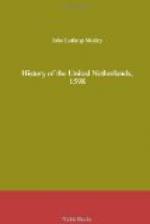His power, was unlimited. A man endowed with genius and virtue, and possessing the advantages of a consummate education, could have perhaps done little more than attempt to mitigate the general misery, and to remove some of its causes. For it is one of the most pernicious dogmas of the despotic system, and the one which the candid student of history soonest discovers to be false, that the masses of mankind are to look to any individual, however exalted by birth or intellect, for their redemption. Woe to the world if the nations are never to learn that their fate is and ought to be in their own hands; that their institutions, whether liberal or despotic, are the result of the national biography and of the national character, not the work of a few individuals whose names have been preserved by capricious Accident as heroes and legislators. Yet there is no doubt that, while comparatively powerless for good, the individual despot is capable of almost infinite mischief. There have been few men known to history who have been able to accomplish by their own exertions so vast an amount of evil as the king who had just died. If Philip possessed a single virtue it has eluded the conscientious research of the writer of these pages. If there are vices —as possibly there are from which he was exempt, it is because it is not permitted to human nature to attain perfection even in evil. The only plausible explanation—for palliation there is none—of his infamous career is that the man really believed himself not a king but a god. He was placed so high above his fellow-creatures as, in good faith perhaps, to believe himself incapable of doing wrong; so that, whether indulging his passions or enforcing throughout the world his religious and political dogmas, he was ever conscious of embodying divine inspirations and elemental laws. When providing for the assassination of a monarch, or commanding the massacre of a townfill of Protestants; when trampling on every oath by which a human being can bind himself; when laying desolate with fire and sword, during more than a generation, the provinces which he had inherited as his private property, or in carefully maintaining the flames of civil war in foreign kingdoms which he hoped to acquire; while maintaining over all Christendom a gigantic system of bribery, corruption, and espionage, keeping the noblest names of England and Scotland on his pension-lists of traitors, and impoverishing his exchequer with the wages of iniquity paid in France to men of all degrees, from princes of blood like Guise and Mayenne down to the obscurest of country squires, he ever felt that these base or bloody deeds were not crimes, but the simple will of the godhead of which he was a portion. He never doubted that the extraordinary theological system which he spent his life in enforcing with fire and sword was right, for it was a part of himself. The Holy Inquisition, thoroughly established as it was in his ancestral Spain, was a portion of




